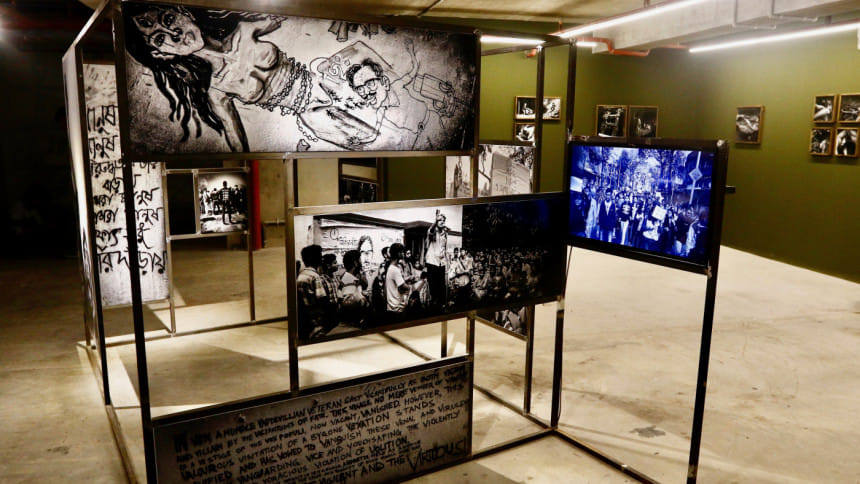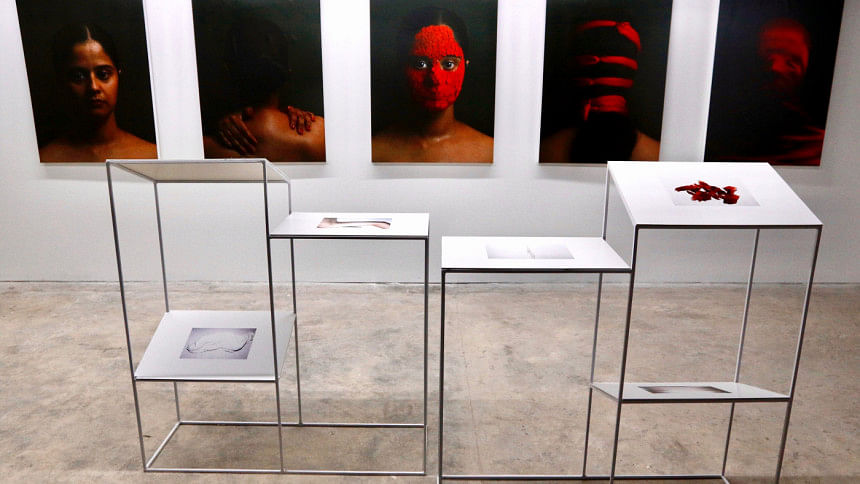Chobi Mela’s ‘[Off] Limits’ gathers photographers from across borders

"[Off] Limits", a group exhibition currently underway in "Chobi Mela Shunno" at DrikPath Bhobon, features projects by fourteen South Asian artistes. As a part of the festival's intention of celebrating and promoting art, the photographs on display focus on life amidst the pandemic, while also looking back at the past to reminiscence over elements that have been forgotten.
Art has played a major role in advocating for equality, and continues to inspire young artists to fight against injustice. "Confrontations" by Bunu Dhungana, revolves around the lives of Nepali women. On the other hand, "Stay Home, Sisters" by Uma Bista, addresses the stigma associated with menstruation. Patriarchy continues to oppress young girls across the region and through her work, Uma wants to question the trauma that is being inherited from older generations.

"Shadow Lives" by Nida Mehboob, highlights the atrocities faced by the Ahmadi minority community in Pakistan. Following similar themes of empathising through art, Aishwarya Arumbakkam's project, "Ka Dingiei", is based on the plight of a landless community. The superficial damage includes loss of property and livelihood and is followed by the intangible loss of one's identity.
Additionally, Karan Shrestha's "Stealing Earth" shares the state of indigenous communities inhabiting the areas close to Chitwan National Park in Nepal. The rhetorical name is used to highlight how wealth and power continues to threaten the existence of underprivileged communities.
There are several instances of using art as a medium to convey rage, while fighting for human rights. Through "A Portrait of a Protest", Ronny Sen displays the anger prevalent in people from various generations, as they protest against the government. The photographs provide insights to various protests in India, including the anti-CAA protests. Thotkata, a collective effort by bloggers to create a vibrant site of resistance, has participated in the exhibition with a "Letter from an unborn child". It questions the various authorities involved with the garment industry, asking them to handle the lives of these workers with more care.
"Bor-Porong'' or "Autobiography of the Drowned" is an attempt to advocate for the rights of Pahari communities, who are forced to face discriminatory practices. During an online event, Samari Chakma and Naeem Mohaiemen read paragraphs from "Kaptai Badh: Bor-Porong", a book written by Samari.
Salma Abedin Prithi's "Torn" inspects the minds of Covid-19 patients in Bangladesh. After researching newspaper images of people's suffering in hospitals, she reconstructed these scenarios in a pop-up studio and focused on the situations that were disregarded by mainstream media. "A nation with no cure" is another pandemic-inspired series by Mahmud Hossain Opu. It covers the progression of the crisis in Bangladesh, accentuating the fragile healthcare system fighting against the virus and the subsequent economic damage.
The exhibition also presents an array of expressions, in forms that are devoid of an organised concept. Sumit Dayal's "Wish you live long" is a visual representation of the beauty of Kashmir. "Inel", by Saadul Islam, intends to provide a different experience to viewers through a sound and light installation. In an attempt to provide physicality to an intangible form, the installation reflects the artist's personal journey of healing. Similarly, Yasmin Jahan Nupur's "Time could not be kept at bay" talks about the psychological changes influenced by the pandemic.
"Intimacies" by Kushal Roy is a project based on a Bengali joint family in Kolkata. The photographs explore relationships by providing a peek into the everyday lives of the members. The uncomplicated tale of a family is a brilliant example of how art is inspired by regular lives. The exhibition will be open to visitors till February 21, from 11 am to 8 pm.

 For all latest news, follow The Daily Star's Google News channel.
For all latest news, follow The Daily Star's Google News channel. 



Comments